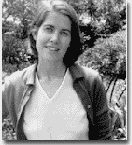Notes on New Chapbooks by Women
by Sarah Anne Cox & Elizabeth Treadwell

Elizabeth
Treadwell

Sarah Anne Cox
Marcella Durand, City of Ports (Situations Press, New York City,1999)
Noemie Maxwell, Thrum (Meow Press, Buffalo,1998)
ET: Thrum–I loved this book. Thoroughly worshiping it on the couch one day in January and it has completely stuck with me–so is it a prose poem or a condensed epic state of being translated into a cute Meow chapbook? Definitely it is a gorgeous, scrambling triumph, knee-deep in grainy, bodily philosophy and adventure. Maxwell seems to turn words and events inside out, words especially, on her true path (?) and us too, if we keep up.
SAC: ...and extremely dense...a layering or timeline which asks the reader to recall an archetypal fiction–"the cottage in the woods, the barricade, the anthracite mine."
ET: ...will you say more about the recalling of archetypal fiction?
SAC: ...archetypal fiction like a mythology where you are supposed to recognize things (like for example "the" cottage in the woods) as a part of your history, but it is interspersed with an unexpected place or thing like "the" anthracite mine as if this is a part of our folk history as well. Which it is.
ET: And does Marcella Durand's book do this in its mapping qualities as well? Or do you think that's running things–architecture, ports, garbage, & myth–together too much?
SAC: No I don't think so. In Durand's chapbook I couldn't stop thinking of Walt Whitman's Song of Myself. It has that epic quality and so makes of itself a myth in it's grandness. The difference is that Durand's book is not peopled...it is the actual street and building which which seem to be agents in the poem. The relation/ the tension inside an archway for example. I love the way life is breathed into electrical wires, trash, the construction of buildings.
ET: Not to run the two books together too much, but I do see a similarity of mapping because the way Durand lets the streets, etc., be agents makes them seem to me to be related to the proverbial cottage in the woods; she allows us to see this hollow city through which we make ourselves small and large even as it, the built world, constructs us, or at least looms over our figures/figuring...I especially like the denseness of Maxwell's book and the sparseness of Durand's as they use these structures (Maxwell: philosophy, mythology, psychology–Durand: architecture, trash heaps, ports of call and their boundaries) we've littered–or those prior to us have littered about to help us make ourselves particular and historical. I would almost say social, but don't want to. They both seem to me to be makingto borrow your phrase– "homes of grammar"–though the grammar stretches outside of language per se and into the rules of a particular city intersection or of a particular philosophical inquiry.
SAC: Both of these chapbooks are really lovely. Meow Press uses beautiful paper and a color cover while Situations has a letterpress cover.
BIOS: Sarah Anne Cox's new chapbook is definite articles and Elizabeth Treadwell's is Eve Doe: Prior to Landscape (movements 9-31) (both, a+bend press, San Francisco,1999).